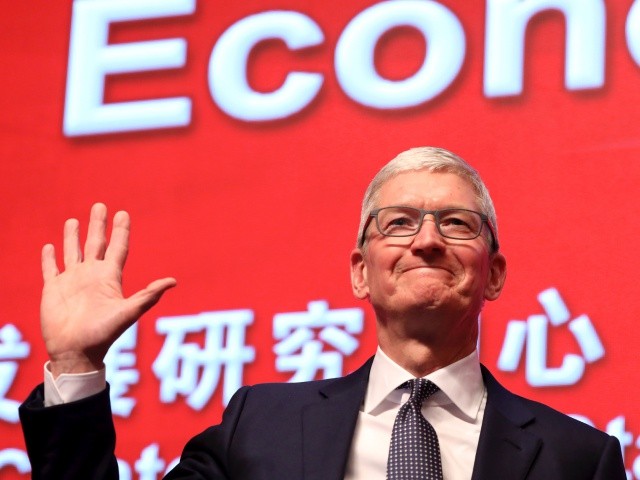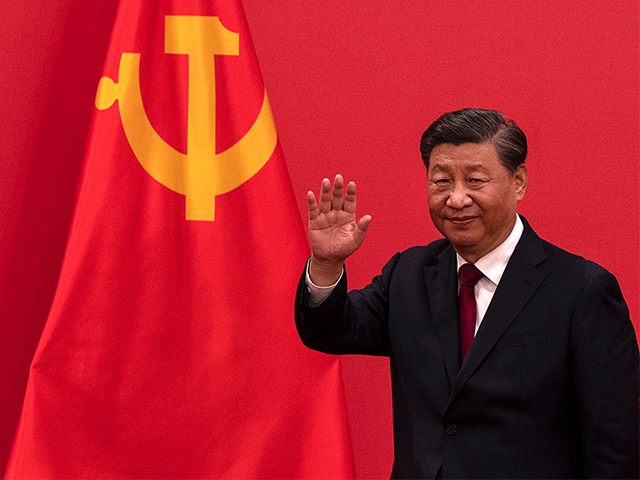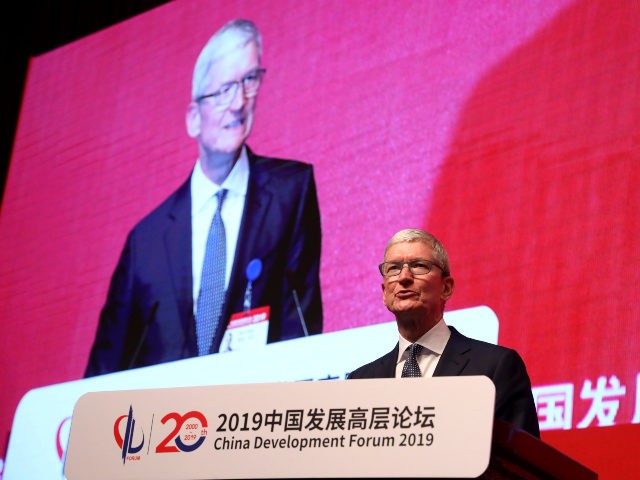Apple is no longer the top-selling smartphone maker in China. The tech giant has lost its place at number one and is now lagging behind Chinese companies Vivo, Huawei, and Honor. This is especially bad for Tim Cook given his secret $275 billion deal with the Communist government to “grow together with Chinese enterprises to achieve mutual benefits and a win-win situation.”
Apple, which became the best-selling smartphone in China for the first time in 2023, has lost its top-selling smartphone maker in the country, Counterpoint Research found, according to a report by Business Insider. The company’s iPhone sales in China reportedly fell by 24 percent in the first six weeks of 2024, the market research firm said.

Apple CEO Tim Cook waves as he arrives for the Economic Summit held for the China Development Forum in Beijing on March 23, 2019. (NG HAN GUAN/AFP via Getty Images)

Xi Jinping waves as he leaves after speaking at a press event with members of the new Standing Committee of the Political Bureau of the Communist Party of China (Photo by Kevin Frayer/Getty Images)
Apple’s drop in sales means the iPhone lost its crown as the best-selling smartphone in China, a status the smartphone had just recently obtained for the first time last year. In 2023, Apple held 19 percent of the market share in China, which has since slipped to 15.7 percent.
Now, the Chinese company Vivo sits at the top as the best-selling smartphone maker in China. Chinese companies Huawei and Honor follow Vivo in second and third place, respectively, while Apple trails behind in fourth place.
“Primarily, it faced stiff competition at the high end from a resurgent Huawei while getting squeezed in the middle on aggressive pricing from the likes of OPPO, Vivo, and Xiaomi,” Meng Meng Zhang, senior analyst at Counterpoint Research, said of Apple’s iPhone.
Notably, smartphone sales in China are also down in general by seven percent when compared to the same period in 2023.
This is not the only problem Apple has recently faced in China.
In January, Chinese chipmakers drafted plans to create chip production lines to supply processors to local smartphone makers, Business Insider noted. This move would hurt Apple, as tight export restrictions have been advantageous for the company.
A general shift toward Chinese companies in China is also reportedly taking place, which may explain some of Apple’s decline in the Communist Regime.
This is an unwanted development for Tim Cook’s Apple, which signed a $275 billion dollar contract with the Chinese government in 2016.
As Breitbart News reported:
The Information reports that Apple CEO Tim Cook signed a deal with China in 2016 worth $275 billion to prevent restrictions on its business in the country. As part of the deal, Apple agreed to help Chinese firms build “the most advanced manufacturing technologies” and invest “many billions of dollars” in the country. The five-year agreement was designed to placate Chinese government officials who felt that Apple was failing to invest enough in the Chinese economy.
Chinese President Xi Jinping vote at the closing of the 19th Communist Party Congress at the Great Hall of the People on October 24, 2017 in Beijing, China. (Lintao Zhang/Getty Images)
In 2016, Cook lobbied Chinese government officials over regulations that could threaten Apple services including the App Store, Apple Pay, and iCloud. Cook signed the deal with China during one of several visits to China that year after Chinese regulators’ actions tanked iPhone sales in the country.
A memo of understanding was created by Apple’s government affairs team in China alongside China’s National Development and Reform Commission to improve the company’s relations with Chinese leaders. Apple executives also made it a priority to meet with top Chinese government officials after the 2016 regulations affected iTunes books and movies.
Breitbart News will continue to report on Apple’s struggles in China.
You can follow Alana Mastrangelo on Facebook and X/Twitter at @ARmastrangelo, and on Instagram.

COMMENTS
Please let us know if you're having issues with commenting.